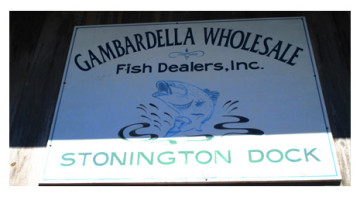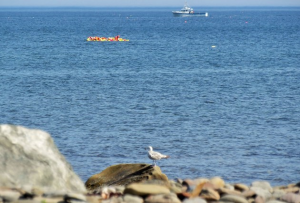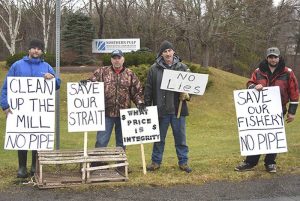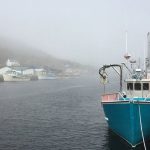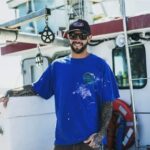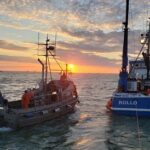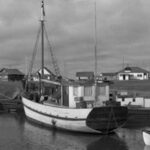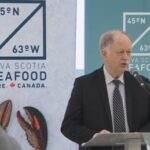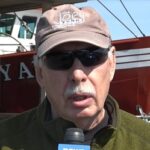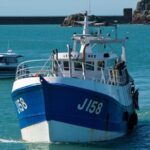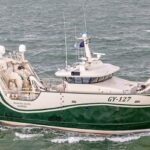Tag Archives: Center For Sustainable Fisheries
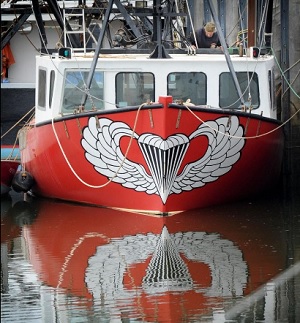
Jack Spillane: NOAA – A rogue agency gets set to shut down another New Bedford fishery
Scott Lang has been around fisheries issues for a long time. Both when he was mayor and afterwards. In 2013, Lang helped organize the Center for Sustainable Fisheries as a grassroots lobbying group to try to make sure New Bedford fishermen were not totally forgotten by NOAA. He’s worked for the industry for a long time and seen a lot of arguments from both sides back-and-forth over the years. But until last week, he said he had never seen NOAA make a decision to close a fishery with no science behind it. Not even questionable science, as for years NOAA has used for New England groundfishing limits in the opinion of many. >click to read<09:42
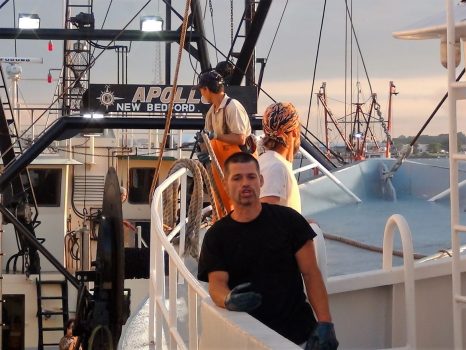
A look back at the evolution of Catch Shares
In 2010 CSF board member Nils Stolpe conducted some exhaustive research into catch shares as a management tool and given what has transpired since it is worth looking over his findings today. Here, for example is a prophetic quote from the NEFMC’S June 2010 Draft Environmental Impact Statement for Amendment 15 to the Council’s Sea Scallop Fishery Management Plan : “…consolidation measures like ITQs, but also more generally leasing and stacking, tend to have their negative impacts on those less powerful segments of the fishing industry, namely the crew, or the small business owners without a fleet of vessels or vertically integrated business. Those who are better able to take advantage of measures like leasing or stacking are then increasingly able to exert control in various markets, such as leasing quota, hiring crew, or even affecting prices that fishermen receive for their product. These kinds of changes, in turn, affect the structure of communities—through changing relations between people and shifts in dominant values—and affect the viability of fishing communities as some are disproportionally impacted by geographic shifts in fishing businesses.” That was about the scallop fleet but the impact is now decimating single boat owners in our New England groundfishery. The complete report (three papers) is included here 14:28
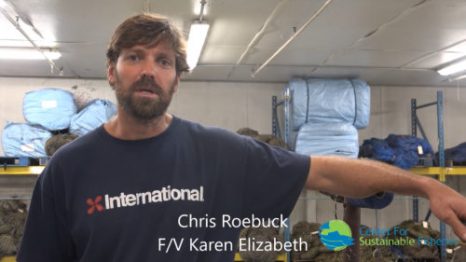
New England: Twin trawl survey validates industry concerns with NOAA assessment
Fishermen in New England do not believe that the survey vessel used by NOAA is catching fish in amounts comparable to what they haul up and have long questioned the fishing gear NOAA employs. To address these doubts a Rhode Island captain, Chris Roebuck went out and towed two nets simultaneously to compare the different gear types. here is what he found. Watch the video here 08:41
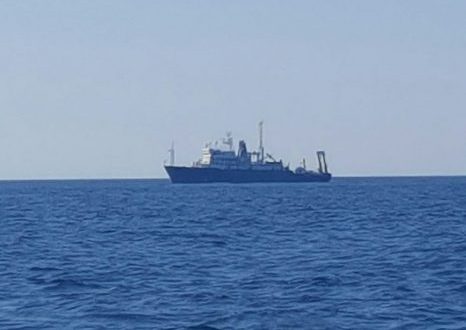
We were here first
So this is what the future looks like in late August from the deck of a fishing vessel south of the Vineyard. This ship is doing a survey looking for good bottom in which to plant offshore wind turbines. Fishermen are looking at this in the same way the Plains Indians probably looked at the Iron Horse. They may not have been up on the marvels of technology but I believe when they heard that whistle blowing they had a gut feeling that there were going to be winners and losers in the new order and they had no illusions about which end of the deal they would probably be getting. This particular area of the ocean is important to squid fishermen and if the turbines go in the fishermen will no longer be able to fish there. These remaining groundfish boats have already been squeezed out of other fisheries given the small quota they are allowed to catch and this represents another threat to their livelihood and way of life.
Promote greater scientific and socio-economic understanding of our nation’s fisheries and our fishing industry
Support the Center for Sustainable Fisheries www.centerforsustainablefisheries.org
NOAA To Enlist Commercial Fishing Boats To Help Gather Data For Stock Surveys
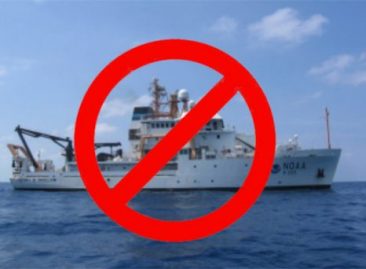 The National Oceanic and Atmospheric Administration has announced it will begin enlisting commercial fishing boats to help gather data for its often-controversial stock surveys – shifting that task at least partially away from its research vessel Henry T. Bigelow(sic). The Bigelow has experienced a number of maintenance issues, which caused a two-month delay in this year’s Spring survey. Fishing advocates are hailing NOAA’s decision, which was spearheaded by the outgoing director of the NOAA Science Center in Woods Hole. They say it represents a realization of the need for greater cooperation among regulators and fishermen. Brian Morris spoke with Don Cuddy of the Center for Sustainable Fisheries about the upcoming change. Listen to the audio report here 08:44
The National Oceanic and Atmospheric Administration has announced it will begin enlisting commercial fishing boats to help gather data for its often-controversial stock surveys – shifting that task at least partially away from its research vessel Henry T. Bigelow(sic). The Bigelow has experienced a number of maintenance issues, which caused a two-month delay in this year’s Spring survey. Fishing advocates are hailing NOAA’s decision, which was spearheaded by the outgoing director of the NOAA Science Center in Woods Hole. They say it represents a realization of the need for greater cooperation among regulators and fishermen. Brian Morris spoke with Don Cuddy of the Center for Sustainable Fisheries about the upcoming change. Listen to the audio report here 08:44
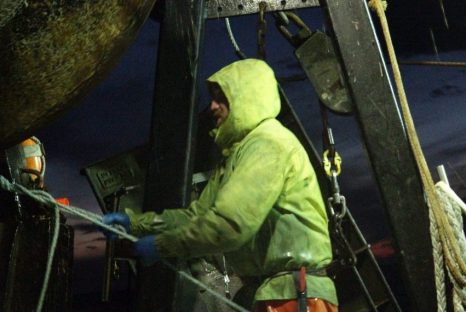
Transition to industry based surveys approved by NOAA. At last!
The announcement from NOAA on Tuesday that they will begin to transition the Northeast Fisheries Science Center’s bottom trawl surveys from their research ship, the Henry B. Bigelow, to fishing industry vessels is a cause for celebration on the waterfront and represents a real opportunity to get the fishing industry in New England out of disaster mode. It is a bold decision but it is undoubtedly the correct one and, from an industry perspective, one that is long overdue. Science Center director Dr. Bill Karp deserves enormous credit for setting this process in motion. It is a clear signal that NOAA wants to build trust and transparency, qualities that have not always been in evidence in its long and difficult relationship with the commercial fishing industry in New England. Read the rest here 13:15
‘Sea change:’ NOAA to shift fish surveys to Commercial Fishing Vessels
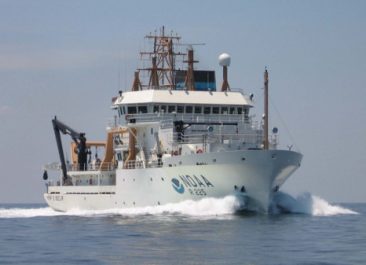 In what one advocate called “a potential sea change” for the commercial fishing industry, NOAA Fisheries announced intentions Tuesday to shift all or part of long-controversial stock surveys from its Bigelow research vessel to commercial boats, saying a transition over the next five years could bring “greater shared confidence” in survey results. “We have to learn to work better with the (commercial fishing) industry — we have to open up better lines of communication,” Dr. Bill Karp, director of NOAA’s Northeast Fisheries Science Center in Woods Hole, said of the transition. Don Cuddy, program director for the Center for Sustainable Fisheries in New Bedford, said fishermen also have felt the Bigelow is unable to accurately count “flatfish,” such as yellowtail flounder, because of the type of gear it tows. “This is going to affect everything across the board — the fishermen have been saying for years that the catch limits and stock assessments do not reflect what they’re seeing on the water,” said Cuddy, who used the “sea change” phrase. Read the story here 15:57
In what one advocate called “a potential sea change” for the commercial fishing industry, NOAA Fisheries announced intentions Tuesday to shift all or part of long-controversial stock surveys from its Bigelow research vessel to commercial boats, saying a transition over the next five years could bring “greater shared confidence” in survey results. “We have to learn to work better with the (commercial fishing) industry — we have to open up better lines of communication,” Dr. Bill Karp, director of NOAA’s Northeast Fisheries Science Center in Woods Hole, said of the transition. Don Cuddy, program director for the Center for Sustainable Fisheries in New Bedford, said fishermen also have felt the Bigelow is unable to accurately count “flatfish,” such as yellowtail flounder, because of the type of gear it tows. “This is going to affect everything across the board — the fishermen have been saying for years that the catch limits and stock assessments do not reflect what they’re seeing on the water,” said Cuddy, who used the “sea change” phrase. Read the story here 15:57
Spreading misinformation about our fisheries
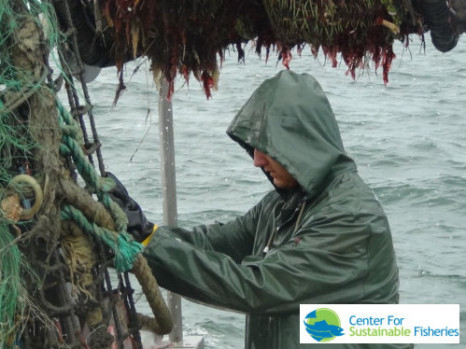 Anyone knowledgeable about the commercial fisheries of the United States will find nothing original in the op-ed piece recently submitted to the New York Times by the environmental organization Oceana. Even its title ‘A Knockout Blow for American Fish Stocks’ is misleading. American fish stocks are healthy. NOAA’S annual report to Congress, submitted at the end of 2014 showed that only twenty-six of the three hundred and eight fish stocks assessed were subject to overfishing. ‘Overfishing’ occurs when too many fish are removed from a population to produce maximum sustainable yield. As a scientific term it is quite misleading, carrying, as it does, the clear implication that low stock assessments result solely from fishing pressure; whereas ‘overfishing’ can result from a number of other factors, such as changes in water temperature or salinity, degraded habitat and increased predation. Read the article here 21:20
Anyone knowledgeable about the commercial fisheries of the United States will find nothing original in the op-ed piece recently submitted to the New York Times by the environmental organization Oceana. Even its title ‘A Knockout Blow for American Fish Stocks’ is misleading. American fish stocks are healthy. NOAA’S annual report to Congress, submitted at the end of 2014 showed that only twenty-six of the three hundred and eight fish stocks assessed were subject to overfishing. ‘Overfishing’ occurs when too many fish are removed from a population to produce maximum sustainable yield. As a scientific term it is quite misleading, carrying, as it does, the clear implication that low stock assessments result solely from fishing pressure; whereas ‘overfishing’ can result from a number of other factors, such as changes in water temperature or salinity, degraded habitat and increased predation. Read the article here 21:20
An Important Message From Scott Lang – Please Help Support The Center For Sustainable Fisheries
 Greetings from all of us here at CSF, This organization was founded on the principle that our fishermen, and the fishing industry, were not getting their voices heard and we wanted that to change. In the constant clamor over catch limits, stock assessments and bycatch there is little respect afforded to people whose livelihood rests squarely on an ability to discern what is occurring in the ocean month to month. In recent months CSF has ramped up its efforts to highlight the problems facing the industry and our groundfishermen in particular. CSF board members Dave Goethel and John Haran have been highly visible on both local and national media on the issue of industry funding of at-sea monitors. CSF program director Don Cuddy has gained valuable exposure for our mission with his excellent op-ed pieces and also with the recent documentary Counting Fish, filmed on the SMAST yellowtail survey trip. Read the rest here, and please donate. They are in YOUR corner! 10:00
Greetings from all of us here at CSF, This organization was founded on the principle that our fishermen, and the fishing industry, were not getting their voices heard and we wanted that to change. In the constant clamor over catch limits, stock assessments and bycatch there is little respect afforded to people whose livelihood rests squarely on an ability to discern what is occurring in the ocean month to month. In recent months CSF has ramped up its efforts to highlight the problems facing the industry and our groundfishermen in particular. CSF board members Dave Goethel and John Haran have been highly visible on both local and national media on the issue of industry funding of at-sea monitors. CSF program director Don Cuddy has gained valuable exposure for our mission with his excellent op-ed pieces and also with the recent documentary Counting Fish, filmed on the SMAST yellowtail survey trip. Read the rest here, and please donate. They are in YOUR corner! 10:00Counting Fish – The full documentary can be seen here!
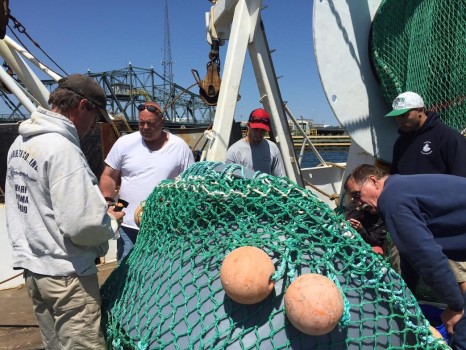 New England groundfishermen are in trouble. The annual catch limits are now set so low that many boats remain tied to the dock. But controversy abounds. The fishing industry has expressed no confidence in the NOAA trawl survey that provides the raw data for the stock assessment. But counting fish in the ocean is no easy task. While everyone agrees that more and better data is needed NOAA Fisheries says its resources are already overtaxed. UMass Dartmouth marine scientist Kevin Stokesbury believes he may have found a solution- using cameras to record fish passing through a net that is intentionally left open, allowing them to escape unharmed. For an unvarnished look into the world of commercial fishing and cutting-edge marine research, join the crew of the F/V Justice of New Bedford for this May 2015 research trip to the famed fishing ground of Georges Bank. Watch the full documentary here. 12:51
New England groundfishermen are in trouble. The annual catch limits are now set so low that many boats remain tied to the dock. But controversy abounds. The fishing industry has expressed no confidence in the NOAA trawl survey that provides the raw data for the stock assessment. But counting fish in the ocean is no easy task. While everyone agrees that more and better data is needed NOAA Fisheries says its resources are already overtaxed. UMass Dartmouth marine scientist Kevin Stokesbury believes he may have found a solution- using cameras to record fish passing through a net that is intentionally left open, allowing them to escape unharmed. For an unvarnished look into the world of commercial fishing and cutting-edge marine research, join the crew of the F/V Justice of New Bedford for this May 2015 research trip to the famed fishing ground of Georges Bank. Watch the full documentary here. 12:51
Press Release: The Center for Sustainable Fisheries fully supports Fishermen in lawsuit
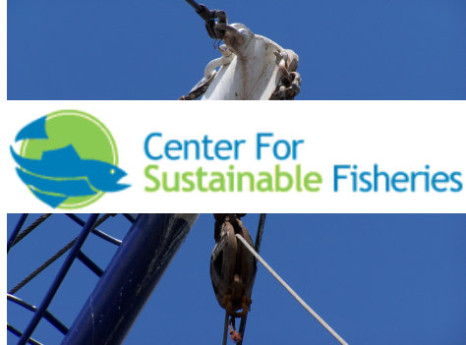 Costs for at-sea monitors will force many fishermen out of business. The Center for Sustainable Fisheries fully supports the lawsuit filed in New Hampshire last week by Cause of Action. The Washington-based watchdog group, which focuses its attention on government overreach, is suing the federal government on behalf of our commercial fishermen in New England. The case is crystal clear. It stems from the high cost for at-sea monitors and the insistence, by NOAA’s intransigent National Marine Fisheries Service, that fishermen must now foot the bill for monitors because the agency has run out of money. Read the press release here 17:43
Costs for at-sea monitors will force many fishermen out of business. The Center for Sustainable Fisheries fully supports the lawsuit filed in New Hampshire last week by Cause of Action. The Washington-based watchdog group, which focuses its attention on government overreach, is suing the federal government on behalf of our commercial fishermen in New England. The case is crystal clear. It stems from the high cost for at-sea monitors and the insistence, by NOAA’s intransigent National Marine Fisheries Service, that fishermen must now foot the bill for monitors because the agency has run out of money. Read the press release here 17:43
Center for Sustainable Fisheries Don Cuddy Rips and Gut’s Oceana’s ‘A Knockout Blow for American Fish Stocks’
 Anyone knowledgeable about the commercial fisheries of the United States will find nothing original in the op-ed piece recently submitted to the New York Times by the environmental organization Oceana. Even its title ‘A Knockout Blow for American Fish Stocks’ is misleading.,, If the recent Oceana opinion piece is a fair reflection of the environmentalist mindset, it reveals the apparent contempt with which commercial fishing, America’s oldest industry, is regarded by such groups. The scallop industry stands accused by Oceana of being “dissatisfied with its current profits.” This is wrong? Cast them into the pit! Perhaps Oceana might test reaction to that proposition on Wall St. or at Wal-Mart. Read the rest here 08:08
Anyone knowledgeable about the commercial fisheries of the United States will find nothing original in the op-ed piece recently submitted to the New York Times by the environmental organization Oceana. Even its title ‘A Knockout Blow for American Fish Stocks’ is misleading.,, If the recent Oceana opinion piece is a fair reflection of the environmentalist mindset, it reveals the apparent contempt with which commercial fishing, America’s oldest industry, is regarded by such groups. The scallop industry stands accused by Oceana of being “dissatisfied with its current profits.” This is wrong? Cast them into the pit! Perhaps Oceana might test reaction to that proposition on Wall St. or at Wal-Mart. Read the rest here 08:08

New England Stock Assessments – If it’s the same, it will never be different, Don Cuddy
We are having a serious problem in New England with the performance of the models used in fishery management. To remedy a situation that, along with some other factors, has led to the current crisis in the groundfish industry, we need new data … and maybe we need new models.,, Getting better data is a theme familiar to anyone with connections to the fishing industry in New England. It is central to the mission at the Center for Sustainable Fisheries and was the focus of the forum CSF sponsored at the New Bedford Whaling Museum in May. Read the rest here 09:03
Fisheries management reform political, says ex-Mayor Scott Lang
 The “middle layer” of the NOAA bureaucracy is not the place to go to seek reforms of a dysfunctional fishery management agency, former Mayor Scott Lang told a meeting of the Center for Sustainable Fisheries Wednesday at the New Bedford Whaling Museum. The theme of the meeting was the worsening problems with NOAA survey trawls in the Gulf of Maine and Georges Bank. Fishermen and scientists from the UMass Dartmouth School for Marine Science and technology traded accounts of wildly different results from government-run survey trawls and those conducted by the fishing boats, including a collaboration with SMAST. Read the rest here 23:25
The “middle layer” of the NOAA bureaucracy is not the place to go to seek reforms of a dysfunctional fishery management agency, former Mayor Scott Lang told a meeting of the Center for Sustainable Fisheries Wednesday at the New Bedford Whaling Museum. The theme of the meeting was the worsening problems with NOAA survey trawls in the Gulf of Maine and Georges Bank. Fishermen and scientists from the UMass Dartmouth School for Marine Science and technology traded accounts of wildly different results from government-run survey trawls and those conducted by the fishing boats, including a collaboration with SMAST. Read the rest here 23:25
NOAA report may underestimate the decline of Northeast groundfish industry
 Dan Georgiana has taken a look at NOAA’s report on the state of the multispecies fishery and drawn his own conclusions. The report follows: The “2013 Final Report on the Performance of the Northeast Multispecies (Groundfish) Fishery (May 2013 – April 2014)” by NOAA’s Northeast Fishery Science Center shows continued decline in almost all measures for the Northeast Groundfishing industry in Fishing Year 2013. The accuracy of the Report is not in question but its employment of legal definitions for active groundfishing vessels and trips may underestimate the declines in this fishery. Read the rest here 12:03
Dan Georgiana has taken a look at NOAA’s report on the state of the multispecies fishery and drawn his own conclusions. The report follows: The “2013 Final Report on the Performance of the Northeast Multispecies (Groundfish) Fishery (May 2013 – April 2014)” by NOAA’s Northeast Fishery Science Center shows continued decline in almost all measures for the Northeast Groundfishing industry in Fishing Year 2013. The accuracy of the Report is not in question but its employment of legal definitions for active groundfishing vessels and trips may underestimate the declines in this fishery. Read the rest here 12:03
NOAA a big part of New Bedford’s groundfishing woes, says new report
![]() Magnuson lies at the root of many problems, conclude the six authors, among whom are economics professor emeritus Dan Georgianna of UMass Dartmouth and Rodney Avila, a longtime local boat owner and activist. NOAA, the arm of Congress charged with implementing the law, tilts the playing field against fishermen by imposing “conservation for conservation’s sake, said Kate Kramer, CEO of the city-based Center for Sustainable Fisheries. Read more here 05:56
Magnuson lies at the root of many problems, conclude the six authors, among whom are economics professor emeritus Dan Georgianna of UMass Dartmouth and Rodney Avila, a longtime local boat owner and activist. NOAA, the arm of Congress charged with implementing the law, tilts the playing field against fishermen by imposing “conservation for conservation’s sake, said Kate Kramer, CEO of the city-based Center for Sustainable Fisheries. Read more here 05:56
Groundfish Recovery and Revitalization Plan Press Release Tomorrow, June 17th at 11am Umass Dartmouth SMAST
 Dear Friends, We just obtained an announcement that tomorrow, June 17th at 11am UMass SMAST will host a press event on its “Groundfish Port Recovery and Revitalization Plan for the Port of New Bedford/Fairhaven.” The Order of Events are as follows: Welcome Remarks from Senator Montigny, Remarks from Mayor Mitchell, Summary of Findings Video of fish count capability, Comments/Questions. The University of Massachusetts Dartmouth, SMAST is located at 706 S Rodney French Blvd, New Bedford, MA 02744. 15:51
Dear Friends, We just obtained an announcement that tomorrow, June 17th at 11am UMass SMAST will host a press event on its “Groundfish Port Recovery and Revitalization Plan for the Port of New Bedford/Fairhaven.” The Order of Events are as follows: Welcome Remarks from Senator Montigny, Remarks from Mayor Mitchell, Summary of Findings Video of fish count capability, Comments/Questions. The University of Massachusetts Dartmouth, SMAST is located at 706 S Rodney French Blvd, New Bedford, MA 02744. 15:51
The Magnuson-Stevens Act is in Need of Congressional Attention
In a recent article titled, “The Magnuson Act: It’s a Keeper” and published in the media outlet Roll Call[1], Eric Schwaab and Bill Hogarth’s representation that the current fisheries management regime is a success and b uilt on sound science is blatantly false and amounts to no more than agency based rhetoric rather than reality. At present, there are a total of 7 Economic Disasters that have been declared by the Secretary of Commerce throughout the United States. These economic disasters are not limited to one region of the country, they span from New England, down the East Coast, into the Gulf of Mexico, and along the Pacific Coast. Read more here 16:41
uilt on sound science is blatantly false and amounts to no more than agency based rhetoric rather than reality. At present, there are a total of 7 Economic Disasters that have been declared by the Secretary of Commerce throughout the United States. These economic disasters are not limited to one region of the country, they span from New England, down the East Coast, into the Gulf of Mexico, and along the Pacific Coast. Read more here 16:41
Guest View: Cause for optimism at NEFMC meeting
![]() Thank you for the report on the Center for Sustainable Fisheries’ proposal that the New England Fisheries Management Council and National Marine Fisheries Service implement an intensive, industry-based, collaborative sampling program focusing on increasing data collection and reducing stock-assessment uncertainty (“Fishery council declines yellowtail proposal,” April 26). Read more here 07:16
Thank you for the report on the Center for Sustainable Fisheries’ proposal that the New England Fisheries Management Council and National Marine Fisheries Service implement an intensive, industry-based, collaborative sampling program focusing on increasing data collection and reducing stock-assessment uncertainty (“Fishery council declines yellowtail proposal,” April 26). Read more here 07:16
CSF STATEMENT ON EXPERIMENTAL GBYTF FISHERY Presented to New England Fishery Management Council
 Dr Rothschild stood before the NFMC yesterday, and read this statement. The status of groundfish stocks in New England is shrouded in considerable uncertainty. This uncertainty often raises the question as to whether stocks that are claimed to be overfished are actually overfished or vice versa. Uncertainty in this determination reflects in turn whether management regulations intended to correct these characterizations are effective. Read the Statement here 10:53
Dr Rothschild stood before the NFMC yesterday, and read this statement. The status of groundfish stocks in New England is shrouded in considerable uncertainty. This uncertainty often raises the question as to whether stocks that are claimed to be overfished are actually overfished or vice versa. Uncertainty in this determination reflects in turn whether management regulations intended to correct these characterizations are effective. Read the Statement here 10:53
Ruling rejects Massachusetts and New Hampshire challenges over science, economic impact
 “In our brief, we cited Justice (Antonin) Scalia’s view that an amount of deference is a permission slip for an arrogation of power,” said Brian Rothschild, president and chief executive officer of the Center for Sustainable Fisheries, which joined the state of Rhode Island in filing amicus briefs on behalf of the plaintiffs. “The problem is that in cases like this, judges are left with really difficult technical decisions. That’s the reason for the deference.” Read more here 07:35
“In our brief, we cited Justice (Antonin) Scalia’s view that an amount of deference is a permission slip for an arrogation of power,” said Brian Rothschild, president and chief executive officer of the Center for Sustainable Fisheries, which joined the state of Rhode Island in filing amicus briefs on behalf of the plaintiffs. “The problem is that in cases like this, judges are left with really difficult technical decisions. That’s the reason for the deference.” Read more here 07:35
Nonprofit Center for Sustainable Fisheries backs suit against NOAA policy
![]()
 Key quotes – charging National Oceanic and Atmospheric Administration’s inability to utilize the best science available led to an “arrogation of power where basic principles of science and the law are ignored to further an agency agenda at the expense and livelihood of fishing communities.”NOAA failed to adhere to “basic scientific principles” and ignored congressional intent “The defendant, expecting the courts to defer to its ‘expertise,’ has become lackadaisical in its actions, management measures and standards for quality fisheries science,” “Unfortunately, the agency did not learn from the scallop and pollock examples,” Read more here 07:45
Key quotes – charging National Oceanic and Atmospheric Administration’s inability to utilize the best science available led to an “arrogation of power where basic principles of science and the law are ignored to further an agency agenda at the expense and livelihood of fishing communities.”NOAA failed to adhere to “basic scientific principles” and ignored congressional intent “The defendant, expecting the courts to defer to its ‘expertise,’ has become lackadaisical in its actions, management measures and standards for quality fisheries science,” “Unfortunately, the agency did not learn from the scallop and pollock examples,” Read more here 07:45
Center for Sustainable Fisheries Files Amicus Brief in Support of Mass, NH, in alleged NOAA National Standards Violations
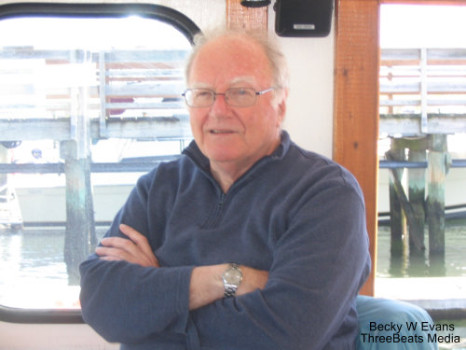 The Center for Sustainable Fisheries (“CSF”) has filed an Amicus Brief in support of the Commonwealth of Massachusetts and the State of New Hampshire in the case brought against the Secretary of Commerce, Secretary Penny Pritzker, and NOAA. Read more here 10:26
The Center for Sustainable Fisheries (“CSF”) has filed an Amicus Brief in support of the Commonwealth of Massachusetts and the State of New Hampshire in the case brought against the Secretary of Commerce, Secretary Penny Pritzker, and NOAA. Read more here 10:26
Alaskans hear East Coast perspective on MSA

 SEATTLE — Several members of the North Pacific Fishery Management Council participated in a workshop on the Magnuson-Stevens Act Tuesday organized by the Center for Sustainable Fisheries and National Fisherman magazine. The Center for Sustainable Fisheries is a New Bedford-based nonprofit. President Brian Rothschild was the primary speaker, offering his perspective on what changes to the Magnuson-Stevens Act are needed. Read more@alaskajournal 09:26
SEATTLE — Several members of the North Pacific Fishery Management Council participated in a workshop on the Magnuson-Stevens Act Tuesday organized by the Center for Sustainable Fisheries and National Fisherman magazine. The Center for Sustainable Fisheries is a New Bedford-based nonprofit. President Brian Rothschild was the primary speaker, offering his perspective on what changes to the Magnuson-Stevens Act are needed. Read more@alaskajournal 09:26
Our View: Complex fisheries need the best minds

 The New England groundfishery is a disaster. Conservationists know it, the federal government knows it, processors, shipyards and supply houses know it. And nobody knows it like fishermen do. The source of the disaster can be summed up in a word: Complexity. Around every corner in the quest to manage the groundfishery lurks another tangled issue. Fishery managers declare catch limits that are little better than arbitrary because our definitions of overfishing are at odds, a condition created by murky, imprecise language in the Magnuson-Stevens Fishery and Conservation Management Act, further complicated by the inability to agree on the size of the fishery, its relative vitality, the impact of warming and acidifying oceans, the number of fish versus the size of the fish, the role of economics and management mechanisms “¦ you get the idea. Dr. Brian Rothschild points out in the policy paper,,Read more@southcoasttoday 09:31
The New England groundfishery is a disaster. Conservationists know it, the federal government knows it, processors, shipyards and supply houses know it. And nobody knows it like fishermen do. The source of the disaster can be summed up in a word: Complexity. Around every corner in the quest to manage the groundfishery lurks another tangled issue. Fishery managers declare catch limits that are little better than arbitrary because our definitions of overfishing are at odds, a condition created by murky, imprecise language in the Magnuson-Stevens Fishery and Conservation Management Act, further complicated by the inability to agree on the size of the fishery, its relative vitality, the impact of warming and acidifying oceans, the number of fish versus the size of the fish, the role of economics and management mechanisms “¦ you get the idea. Dr. Brian Rothschild points out in the policy paper,,Read more@southcoasttoday 09:31






